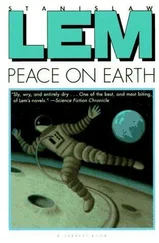And even were we to find such laws, laws that future advances would not supplant, we would not be able to distinguish them from those that eventually will be discarded. For this reason I could respect philosophers only as people driven by curiosity, never as propounders of truth. When, in formulating their theses of categorical imperatives, of the relationship of thought to perception — when did they conscientiously undertake to question, first, a large number of human subjects? No — they consulted always and only themselves. It is this repeated self-enthronement of theirs, this tacit setting up of themselves as models of Homo sapiens, that has always aggravated me and made it hard for me to read “profound” works — because in them I quickly reach the place where the author’s obvious is no longer mine, and thereafter he speaks only to himself, tells only of himself, appeals only to himself, and loses the right to deliver pronouncements that are valid for me, not to mention the rest of the bipeds that populate the planet.
I had to laugh, for instance, at the assurance of those who determined that all thought was linguistic. Those philosophers did not know that they were creating a subset of the species, i.e., the group of those not gifted mathematically. How many times in my life, after the revelation of a new discovery, having formulated it so solidly that it was quite indelible, unforgettable, was I obliged to wrestle for hours to find for it some verbal suit of clothes, because the thing had been born, in me, beyond the pale of all language, natural or formal?
I call this phenomenon “surfacing.” It defies description, because what emerges from the unconscious with difficulty, slowly, finds nests of words for itself; it exists as an entity before it settles inside those nests; yet I can give no indication, no hint, to explain in precisely what form that non- and preverbalness appears; it is heralded only by a keen presentiment that the expectation of it will not be in vain. The philosopher who does not know such states from introspection is, with respect to the quality of certain mechanisms in the brain, a man unlike me; we may belong to the same species, but we differ far more than such thinkers could wish.
It was precisely with regard to the vulnerability and the huge risk that the philosopher takes upon himself that the situation of the people of the Project was similar, in the face of its central problem. What did we have to work with? A mystery and a jungle of guesses. From the mystery we chipped off a few slivers of fact, but when they did not increase, or amount to any solid edifice that could correct our hypotheses, the hypotheses began gradually to assume the upper hand, and in the end we wandered lost in a wilderness of conjectures, of conjectures based upon conjectures. Our constructs became more and more inspired and bold, more and more removed from the store of accumulated knowledge — we were prepared to raze that store, to lay in ruins the most sacred principles of physics or astronomy, if only we could possess the mystery. So it seemed to us.
The reader who has plowed his way to this point and is waiting, with growing impatience, to be led into the inner sanctum of the famous enigma, in the hope that I will regale him with thrills and chills every bit as delightful as those he experiences viewing horror movies, I advise to set my book down now, because he will be disappointed. I am writing no sensational story, but telling how our civilization was subjected to a test of cosmic — or at least of more-than-terrestrial-universality, and what came of this. From the beginning of my work in the Project, I believed that the Project was just such a test, quite apart from the question of what benefits were anticipated from my activity and that of my friends.
He who has been following me closely may have noticed that in shifting the problem of “carrousel-like reasoning” from the relationship between myself and my theme, to the theme itself (i.e., to the relationship between the scientists and His Master’s Voice), I extricated myself from an embarrassing position, widening the accusation of “undisclosed sources of inspiration” until it covered the entire Project. But that had been my intention even before I heard such criticism. With an exaggeration that is necessary for the clarification of my meaning, I will say that in the course of my work (it is difficult to say exactly when this occurred) I began to suspect that the “letter from the stars” was, for us who attempted to decipher it, a kind of psychological association test, a particularly complex Rorschach test. For as a subject, believing he sees in the colored blotches angels or birds of ill omen, in reality fills in the vagueness of the thing shown with what is “on his mind,” so did we attempt, behind the veil of incomprehensible signs, to discern the presence of what lay, first and foremost, within ourselves.
This suspicion hampered my work, and now has compelled me to make confessions I would have much preferred not to make; I realize, however, that a scientist baffled to that degree can no longer regard his professional ability as a kind of isolated gland or molar; he may not, therefore, conceal even the most embarrassing of his personal problems. A botanist who classifies flowers has not much of a field on which to project schemata of his fantasies, illusions, and perhaps even dishonorable passions. The researcher of ancient myths runs a greater risk, because — given their abundance — the very choice he makes may testify more to what pervades his dreams and unscientific thoughts than to what constitutes the structural invariables of the myths themselves.
The people of the Project were forced to take the next, reckless step — accepting a risk of the nature mentioned above but on a scale hitherto unknown. None of us knows, therefore, to what extent we were the instruments of an objective analysis, to what extent the delegates of humanity (in that we have been shaped by and are typical of our society), and to what extent, finally, each of us represented only himself, with the inspiration for his hypotheses about the contents of the “letter” being supplied by his own — possibly raving, possibly wounded — psyche in its uncontrolled regions.
Misgivings of this kind, when I voiced them, were treated by many of my colleagues as pure drivel. They may have used other words, but that was what they meant.
I understood them perfectly. The Project constituted a precedent in which, like those Russian wooden dolls-within-dolls, sat other precedents, and primarily this: that never before had physicists, engineers, chemists, nucleonicists, biologists, or information theorists held in their hands an object of research that represented not only a certain material — hence natural — puzzle, but which had been intentionally made by Someone and transmitted, and where the intent must have taken into account the potential addressee. Because scientists learn to conduct so-called games with nature, with a nature that is not — from any permissible point of view — a personal antagonist, they are unable to countenance the possibility that behind the object of investigation there indeed stands a Someone, and that to become familiar with that object will be possible only insofar as one draws near, through reasoning, to its completely anonymous creator. Therefore, though they supposedly knew and freely admitted that the Sender was a reality, their whole life’s training, the whole acquired expertise of their respective fields, worked against that knowledge.
A physicist never thinks that Someone has set the electrons in their orbits for the express purpose of making him, the physicist, rack his brains over orbital configurations. He knows that the hypothesis of a Setter of Orbits is, in physics, completely unnecessary — more, altogether inadmissible. But in the Project such an impossibility turned out to be an actuality; physics stood by useless in its prior posture; genuine agonies were suffered because of this. What I have said should, I think, make it clear that inside the Project I occupied a rather isolated position (in the theoretical, general sense, of course, not administratively).
Читать дальше












